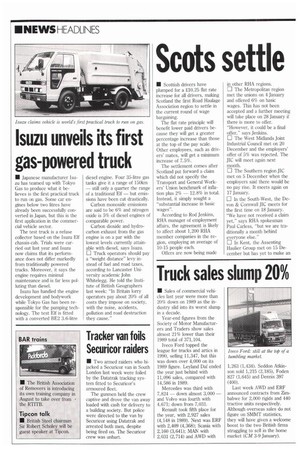Scots settle
Page 6

If you've noticed an error in this article please click here to report it so we can fix it.
II Scottish drivers have plumped for a £10.25 flat rate increase for all drivers, making Scotland the first Road Haulage Association region to settle in the current round of wage bargaining.
The flat rate principle will benefit lower paid drivers because they will get a greater percentage increase than those at the top of the pay scale. Other employees, such as drivers' mates, will get a minimum increase of 7.5%.
The settlement comes after Scotland put forward a claim which did not specify the Transport and General Workers' Union benchmark of infla tion plus 2% 12.8% in total. Instead, it simply sought a "substantial increase in basic wages".
According to Rod Jenkins, RHA manager of employment affairs, the agreement is likely to affect about 1,200 RHA member companies in the region, employing an average of 10-15 people each.
Offers are now being made in other RHA regions.
LI The Metropolitan region met the unions on 4 January and offered 6% on basic wages. This has not been accepted and a further meeting will take place on 28 January if there is more to offer. "However, it could be a final offer," says Jenkins. El The West Midlands Joint Industrial Council met on 20 December and the employers' offer of 5% was rejected. The JIC will meet again next month.
O The Southern region JIC met on 5 December when the employers said there would be no pay rise. It meets again on 17 January.
O In the South-West, the Devon & Cornwall JIC meets for the first time on 18 January. "We have not received a claim yet," says RHA spokesman Paul Carless, "but we are traditionally a month behind everyone else."
O In Kent, the Assenting Haulier Group met on 15 December but has yet to make an
































































